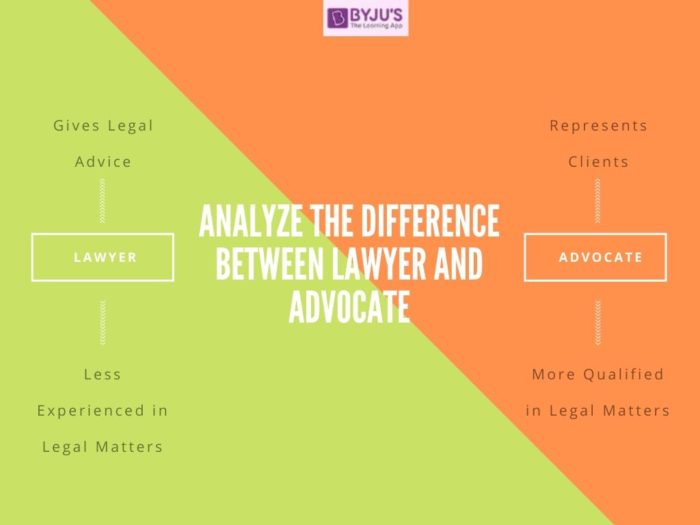In the realm of the judiciary, lawyers and advocates are used often when seeking legal redressal in courts.
Yet they are different from each other based on a variety of factors.
A lawyer is a general term used to describe a legal professional who has attended law school and obtained a Bachelor of Law (LLB) degree. In this article, you can read all about the difference between lawyer and advocate. These terms are used interchangeably in common language but there is a subtle distinction between the two. It is important to understand the difference between lawyer and advocate as UPSC aspirants so that you can use them judiciously in the IAS exam.
IAS Exam aspirants can also read related articles from the links below:

An advocate is a specialist in law and can represent clients in court.
Aspirants can find more Difference Between Articles, by visiting the linked page.
This article will further highlight the differences between a Lawyer and an Advocate within the context of the IAS Exam.
Differences between Lawyer and Advocate
| Lawyer |
Advocate |
| The term ‘lawyer’ is very general in nature and used to designate anyone in the legal profession, including a solicitor, barrister and attorneys | An advocate, on the other hand, is a qualified individual who represents the client in a court of law, pleading for compensation or release depending on the nature of the case. |
| In India, if lawyers/law graduates want to practice in a court of law, they need to be enrolled in a state bar council and clear the All India Bar Exam | After clearing the bar exam and enrolling in a state bar council, a person can refer to himself/herself as an advocate and can represent clients in court |
| Lawyers have less experience as compared to advocates as having just graduated from law school they are yet to acquire the necessary experience needed to represent clients | They can be considered more experienced than lawyers who have had the opportunity to practise their profession in many different legal domains |
| The duties and responsibilities of a lawyer involved in giving legal advice to their clients, but they cannot represent them in a court of law | Since advocates have a vast array of knowledge, experience and skill in legal matters, they are heavily involved in representing their clients most of the time, and while pleading on their behalf, advocates try their utmost to get the best verdict for their clients |
| The charges and compensation for a lawyer are low since he/she may not have the necessary skill and knowledge to litigate in a court of law | Advocates charge much higher than lawyers for their services as they are more skilled and qualified to represent their clients in a wide variety of legal matters |
The terms lawyers and advocates have often been featured in questions from the Polity segment of the UPSC Exams. Aspirants can find study this segment thoroughly with the help of the links given below
- Indian Polity Notes for UPSC
- Polity Syllabus and Strategy for UPSC
- Polity MCQs for UPSC IAS Prelims
- Indian Polity Questions from UPSC Mains GS 2
How can a lawyer become an advocate?
A lawyer is someone who has completed their legal education; however, they are not allowed to represent their clients in court. A lawyer must fulfil specific prerequisites in order to become an advocate.
The Bar Council of India exam, often known as the BCI examination, must be taken by applicants who have earned a legal degree but are not advocates. To add their name to the BAR council list, the lawyer must pass the test. The candidate will next be granted a licence by the bar council to practise law in a courtroom and hence become an advocate.
Frequently Asked Questions on Difference Between Lawyer and Advocate
Q 1. How is an Advocate different from a Lawyer?
Q 2. How is the responsibility of an advocate and lawyer different?
Aspirants can become familiar with the general pattern of the exam by knowing the syllabus of the UPSC. For more UPSC-related preparation materials, refer to the links given below:
Related Links:


Comments